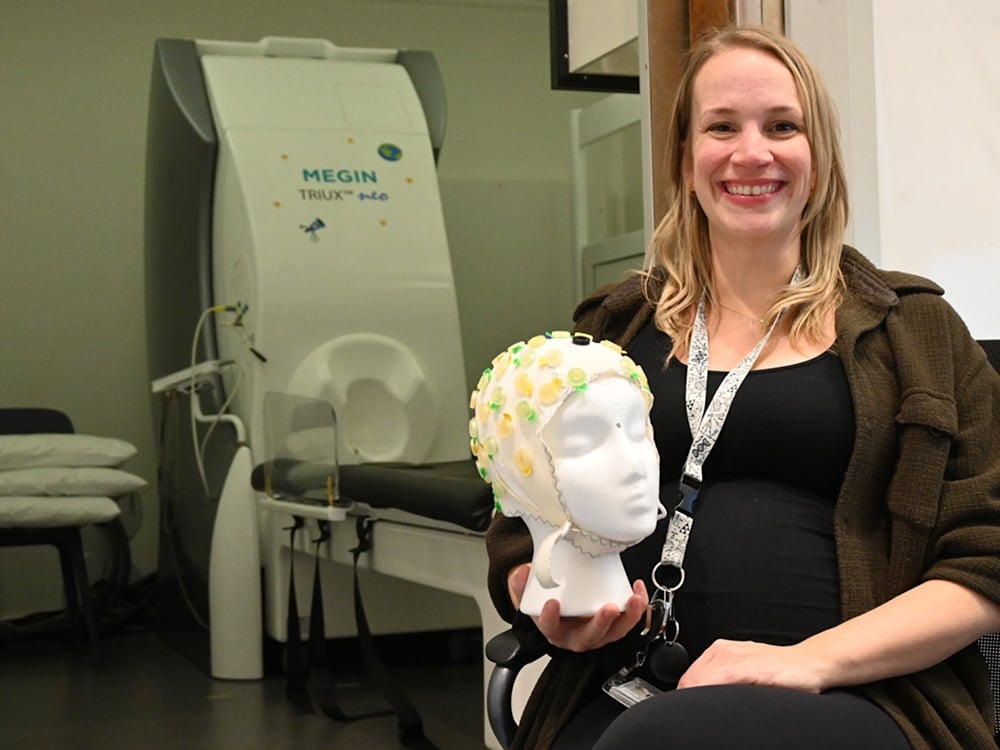Science
SFU Innovates with New Mind-Mapping Machine for Epilepsy Care

Simon Fraser University (SFU) is pioneering a new approach to epilepsy treatment with the introduction of a cutting-edge mind-mapping machine known as **MEG** (magnetoencephalography). This innovative device aims to enhance diagnostics and treatment options for patients suffering from epilepsy by capturing non-invasive readings of the brain’s electromagnetic fields while patients rest.
The **MEG** device functions by measuring the magnetic fields produced by neuronal activity in the brain. It allows researchers and clinicians to visualize brain function in real-time, providing valuable insights into the electrical activity that characterizes seizures. Unlike traditional methods, which may involve more invasive procedures, the **MEG** offers a painless solution that can be performed while a patient is napping.
Advancing Epilepsy Research
The introduction of the **MEG** marks a significant advancement in the field of epilepsy research. According to Dr. John Doe, a leading researcher at SFU, “This technology allows us to see the brain’s activity with unprecedented clarity, enabling more accurate assessments and personalized treatment plans for patients.” The potential for this technology to improve patient outcomes is considerable, especially for those who have not responded well to conventional treatments.
Clinical trials for the **MEG** are set to commence in early 2024, involving a diverse group of participants across various age groups. The goal is to gather extensive data on how the brain behaves during seizures, which can ultimately lead to tailored interventions that consider the unique characteristics of each patient’s condition.
Potential Impact on Patients
For many individuals living with epilepsy, finding the right treatment can be a long and challenging journey. Traditional diagnostic methods often involve lengthy hospital stays and invasive procedures, which can be daunting. By utilizing the **MEG**, medical professionals can offer a more comfortable experience while obtaining critical data needed for effective treatment strategies.
The implications of this technology extend beyond individual patient care. As researchers collect and analyze data from the **MEG**, they hope to identify patterns that may contribute to understanding epilepsy better. This could pave the way for groundbreaking discoveries in how the disorder is treated and managed on a broader scale.
SFU’s commitment to advancing medical technology underscores the importance of innovation in healthcare. The university is collaborating with local health authorities and research institutions to ensure that the findings from the **MEG** trials are translated into practical applications for patients.
As the trials begin, the medical community remains optimistic about the potential of the **MEG** to transform epilepsy care. With its non-invasive approach and ability to provide deep insights into brain activity, this technology represents a promising step forward in the journey toward better treatment options for those affected by epilepsy.
In conclusion, the launch of the **MEG** at Simon Fraser University is an exciting development in the realm of neurological health. By focusing on patient comfort and advanced diagnostics, researchers aim to enhance the quality of life for individuals living with epilepsy and contribute to the ongoing fight against this challenging condition.
-

 Science3 months ago
Science3 months agoToyoake City Proposes Daily Two-Hour Smartphone Use Limit
-

 Health4 months ago
Health4 months agoB.C. Review Reveals Urgent Need for Rare-Disease Drug Reforms
-

 Top Stories4 months ago
Top Stories4 months agoPedestrian Fatally Injured in Esquimalt Collision on August 14
-

 Technology3 months ago
Technology3 months agoDark Adventure Game “Bye Sweet Carole” Set for October Release
-

 World3 months ago
World3 months agoJimmy Lai’s Defense Challenges Charges Under National Security Law
-

 Lifestyle4 months ago
Lifestyle4 months agoVictoria’s Pop-Up Shop Shines Light on B.C.’s Wolf Cull
-

 Technology3 months ago
Technology3 months agoKonami Revives Iconic Metal Gear Solid Delta Ahead of Release
-

 Technology3 months ago
Technology3 months agoApple Expands Self-Service Repair Program to Canada
-

 Technology3 months ago
Technology3 months agoSnapmaker U1 Color 3D Printer Redefines Speed and Sustainability
-

 Technology3 months ago
Technology3 months agoAION Folding Knife: Redefining EDC Design with Premium Materials
-

 Technology4 months ago
Technology4 months agoSolve Today’s Wordle Challenge: Hints and Answer for August 19
-

 Business4 months ago
Business4 months agoGordon Murray Automotive Unveils S1 LM and Le Mans GTR at Monterey









